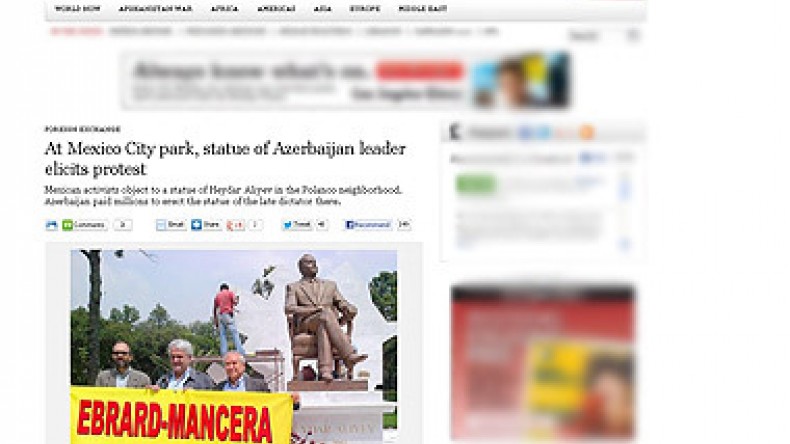
At Mexico City park, statue of Azerbaijan leader elicits protest
Tracy Wilkinson for Los Angeles Times
The leafy green parks of Mexico City's elegant Polanco neighborhood have their politically comforting statues.
There's Abraham Lincoln, poised thoughtfully near a shallow pond. Across from him, there's Martin Luther King. And a few blocks away, Mohandas Gandhi.
And then there's the newest addition, a real head-scratcher: Heydar Aliyev, the late strongman of Azerbaijan.
The presence of Aliyev, in larger-than-life bronze on a well-traveled segment of the city's iconic Reforma Boulevard, has infuriated residents. At least those few who are able to figure out who he is.
"It would be like taking the Washington Mall, and putting a memorial for Idi Amin there," said Eduardo Farah, a community activist, referring to the former Ugandan dictator.
Farah led a small demonstration the other day at Aliyev's feet. Some of the 20 or so participants waved a banner calling for removal of "the dictator."
"This is an affront," said demonstrator Homero Aridjis, an acclaimed poet and environmentalist. "We have enough bad symbols here in Mexico, we don't need to import them from outside."
Even worse, they say, is the gradual loss of valuable green space in this pollution-choked megalopolis as an income-seeking local government sells off or relinquishes wooded parcels. Some are pieces of the storied Chapultepec Park, the largest in Latin America at about 1,700 acres and cherished as an urban oasis — the so-called lungs of the city — since the time of the Aztecs.
The government of Azerbaijan, a former Soviet republic a gazillion miles from Mexico (more than 7,800, for you sticklers), was allowed to erect the statue after paying to spruce up that particular corner of Polanco, even though that meant tearing down a few trees. It spent $3 million to $5 million for the 1/3 -acre patch plus another park downtown.
Aliyev sits on a white marble pedestal, his name embossed in golden letters, in front of a jagged stone map of Azerbaijan. Wrought iron benches for viewing surround the statue and a plaque tells us that the former KGB master, who ruled from 1993 until just before his death in 2003, "is a shining example of infinite devotion to the homeland" who steered Azerbaijan through "prosperous democratic development."
(There's no mention of WikiLeaks cables in which an American ambassador compared the Aliyev dynasty to the Mafia's Corleone family. Or to Azerbaijan's ranking by Transparency International as one of the most corrupt countries, or its many years on a U.S. government blacklist. Or to the numerous human rights reports that accuse the Aliyevs — Heydar was succeeded by his son Ilham — of repressing domestic dissent.)
Marcelo Ebrard, the leftist mayor of Mexico City, attended the inauguration of the monument in August, amid great fanfare.
For some of his critics, it was hard to imagine that Ebrard could so enthusiastically embrace a man widely seen as a dictator who seemingly stood for many things the Mexico City mayor does not. Far from being apologetic, however, Ebrard highlighted the contribution from Azerbaijan as a major achievement of his administration, which is coming to an end.
A semiofficial citizens panel, which is supposed to oversee use of Chapultepec Park lands, initially gave its approval for the Aliyev statue. But as controversy has brewed, members of the panel have backpedaled, saying now they had no idea of the abuses attributed to Aliyev.
"We didn't know who this new republic was," committee member Monica del Villar said in a radio interview. The project "they presented to us was completely different from what they built," she said.
Ebrard's office did not respond to queries about the monument and the selling-off of green space.
The globe-trotting mayor, who aspires to run for president of Mexico in 2018, has always sought to portray his government as eco-friendly. He famously has overseen bike commuting and garbage recycling in the capital, which is formally known as the Federal District.
But Farah and the activists say that 20% to 30% of Chapultepec and other parks have been sold or lent to private developers for uses varying from cantinas to apartment complexes and office towers.
"It is a very, very tough attack on that that is green," Farah said.
City law expressly prohibits the building of structures or the change of land use in all public parks, gardens, plazas with vegetation and other green space. Violation is punishable with jail and fines.
The law, however, allows exceptions if the "competent authority" determines that a project furthers "environmental protection, fomentation or education."
That may be the wiggle room into which Ebrard fit the statue. In his final annual "state of the city" address last month, he touted the project as a smart plan to get an outside sponsor to pay for landscaping — however garish, evidently, it might be.
As for the Azerbaijanis, it appears they are keen to burnish their nation's image abroad wherever they might find a receptive audience. (A town in Ontario, Canada, reportedly removed a statue honoring Aliyev last month after objections there.)
Azerbaijan's ambassador to Mexico, Ilgar Mukhtarov, said his government hoped to expand ties with Mexico, which he described as one of the first countries to recognize Azerbaijan after its independence from Moscow. Azerbaijan and Mexico both have struggling economies despite large oil production, but enjoy little else in common.
"When the city government approached and invited me to be part of a project to recover public space," Mukhtarov told Mexican journalists at the inauguration of the Aliyev monument, "I was delighted because I was looking for a place to show off my country."
The spot is now called the Park of Friendship.
Farah, Aridjis and the other activists have something else in mind: How about the Park of Shame?
Newsfeed
Videos






























